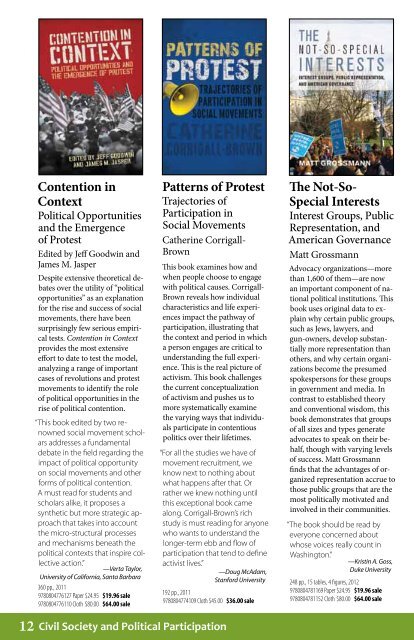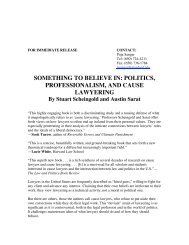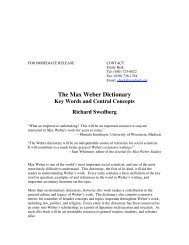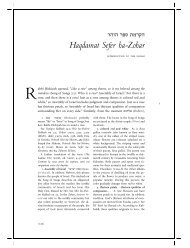Download the PDF - Stanford University Press
Download the PDF - Stanford University Press
Download the PDF - Stanford University Press
Create successful ePaper yourself
Turn your PDF publications into a flip-book with our unique Google optimized e-Paper software.
Contention in<br />
Context<br />
Political Opportunities<br />
and <strong>the</strong> Emergence<br />
of Protest<br />
Edited by Jeff Goodwin and<br />
James M. Jasper<br />
Despite extensive <strong>the</strong>oretical debates<br />
over <strong>the</strong> utility of “political<br />
opportunities” as an explanation<br />
for <strong>the</strong> rise and success of social<br />
movements, <strong>the</strong>re have been<br />
surprisingly few serious empirical<br />
tests. Contention in Context<br />
provides <strong>the</strong> most extensive<br />
effort to date to test <strong>the</strong> model,<br />
analyzing a range of important<br />
cases of revolutions and protest<br />
movements to identify <strong>the</strong> role<br />
of political opportunities in <strong>the</strong><br />
rise of political contention.<br />
“This book edited by two renowned<br />
social movement scholars<br />
addresses a fundamental<br />
debate in <strong>the</strong> field regarding <strong>the</strong><br />
impact of political opportunity<br />
on social movements and o<strong>the</strong>r<br />
forms of political contention.<br />
A must read for students and<br />
scholars alike, it proposes a<br />
syn<strong>the</strong>tic but more strategic approach<br />
that takes into account<br />
<strong>the</strong> micro-structural processes<br />
and mechanisms beneath <strong>the</strong><br />
political contexts that inspire collective<br />
action.”<br />
—Verta Taylor,<br />
<strong>University</strong> of California, Santa Barbara<br />
360 pp., 2011<br />
9780804776127 Paper $24.95 $19.96 sale<br />
9780804776110 Cloth $80.00 $64.00 sale<br />
Patterns of Protest<br />
Trajectories of<br />
Participation in<br />
Social Movements<br />
Ca<strong>the</strong>rine Corrigall-<br />
Brown<br />
This book examines how and<br />
when people choose to engage<br />
with political causes. Corrigall-<br />
Brown reveals how individual<br />
characteristics and life experiences<br />
impact <strong>the</strong> pathway of<br />
participation, illustrating that<br />
<strong>the</strong> context and period in which<br />
a person engages are critical to<br />
understanding <strong>the</strong> full experience.<br />
This is <strong>the</strong> real picture of<br />
activism. This book challenges<br />
<strong>the</strong> current conceptualization<br />
of activism and pushes us to<br />
more systematically examine<br />
<strong>the</strong> varying ways that individuals<br />
participate in contentious<br />
politics over <strong>the</strong>ir lifetimes.<br />
“For all <strong>the</strong> studies we have of<br />
movement recruitment, we<br />
know next to nothing about<br />
what happens after that. Or<br />
ra<strong>the</strong>r we knew nothing until<br />
this exceptional book came<br />
along. Corrigall-Brown’s rich<br />
study is must reading for anyone<br />
who wants to understand <strong>the</strong><br />
longer-term ebb and flow of<br />
participation that tend to define<br />
activist lives.”<br />
—Doug McAdam,<br />
<strong>Stanford</strong> <strong>University</strong><br />
192 pp., 2011<br />
9780804774109 Cloth $45.00 $36.00 sale<br />
The Not-So-<br />
Special Interests<br />
Interest Groups, Public<br />
Representation, and<br />
American Governance<br />
Matt Grossmann<br />
Advocacy organizations—more<br />
than 1,600 of <strong>the</strong>m—are now<br />
an important component of national<br />
political institutions. This<br />
book uses original data to explain<br />
why certain public groups,<br />
such as Jews, lawyers, and<br />
gun-owners, develop substantially<br />
more representation than<br />
o<strong>the</strong>rs, and why certain organizations<br />
become <strong>the</strong> presumed<br />
spokespersons for <strong>the</strong>se groups<br />
in government and media. In<br />
contrast to established <strong>the</strong>ory<br />
and conventional wisdom, this<br />
book demonstrates that groups<br />
of all sizes and types generate<br />
advocates to speak on <strong>the</strong>ir behalf,<br />
though with varying levels<br />
of success. Matt Grossmann<br />
finds that <strong>the</strong> advantages of organized<br />
representation accrue to<br />
those public groups that are <strong>the</strong><br />
most politically motivated and<br />
involved in <strong>the</strong>ir communities.<br />
“The book should be read by<br />
everyone concerned about<br />
whose voices really count in<br />
Washington.”<br />
—Kristin A. Goss,<br />
Duke <strong>University</strong><br />
248 pp., 15 tables, 4 figures, 2012<br />
9780804781169 Paper $24.95 $19.96 sale<br />
9780804781152 Cloth $80.00 $64.00 sale<br />
12 Civil Society and Political Participation
















